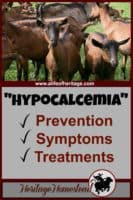Hypocalcemia in goats is very serious. It can be prevented. A goat owner should do everything in their power to give their goat everything they need. This is one post in our Raising Goats series.
If you’ve read these articles…
Treatment for “Pregnancy Toxemia”
What You Need to Know About Nutrition During all the Stages of a Goat’s Pregnancy
…then you know that a goat’s pregnancy will generally go smoothly. If proper nutrition isn’t available to your doe, however, complications can arise. And when they do, it can get complicated and downright scary…fast!
You can find a lot of articles here on A Life of Heritage that will teach you about goat care and be sure to check out The Goat Health, and Information Bundle–it’s full of to-do lists, checklists, record keeping sheets, and resource pages that will get your new (or old) goat herd off to a terrific start!
*TIP: Record all the health setbacks and information of each goat, like hypocalcemia, in the goat health and information binder linked below.
You are organized. You are knowledgeable. You are proactive. This is how. Click below to get this binder in your hands to avoid common errors that affect your goat's health. These records are your freedom and your goat's optimal health.Goat Essential ↓
Goat Management Binder
If you like this information, my YouTube channel is full of even more goat information. Please click this link: Delci | A Life of Heritage and subscribe! You can also click this link to watch this information on YouTube: Goat Hypocalcemia Video on YouTube
One issue that may arise is hypocalcemia and it raises its ugly head when the goat isn’t getting the nutrition it needs to support the growing kids inside.
What is hypocalcemia in goats, which is also called “milk fever”?
Hypocalcemia in goats is a Calcium deficiency.
During pregnancy and lactation, the goat is not having her calcium needs met because of incorrect feeding.
-
Prevention is key:
- There is a strong correlation between how well we feed our animals and their health!
- Calcium is abundant in alfalfa. Start giving your goat alfalfa hay around the 90-day mark and continue to give her alfalfa hay during the duration of her lactation.
- But ironically, too much calcium causes its own problems. When too much calcium is in a doe’s system during the last month of pregnancy, her body will send all the extra calcium to her bones instead of into milk production. So really, hypocalcemia can be a situation where the calcium is not going where it needs to instead of being a deficiency.
- In the last month of pregnancy, stop giving alfalfa or peanut hay which are usually high in calcium. This will allow the doe to send her calcium reserves to where they need to go to be utilized properly.
- Exercise is also another important component in a goat’s life.
- Always provide loose mineral
-
Symptoms to watch for:
- apparent weakness.
- Decreased appetite
- Mild bloat or constipation
- Doe wobbly on her feet.
- Inability to stand.
- trembling in the muscles
- Weakened uterine contractions
- Decreased body temperature.
- The doe may stop ruminating, urinating, or defecating.
- Shivering after milking
-
Treatment:
- You will first want to treat her as you did for pregnancy toxemia so she does not go into a state of ketosis.
- You will then want to treat her in this fashion:
- Use a product called CMPK DURVET 067645 Cmpk Gel, 300ml
- CMPK is a product that contains calcium as well as magnesium, phosphorus, and potassium, all of which makes the calcium more readily available for the body to use. The calcium will be utilized much quicker and the doe will return to health faster.
- This treatment will need to be given until the doe has reached optimal health and is being fed a sufficient calcium-filled diet. If only one dose is given, it will balance her levels of calcium only for the moment. As the babies continue to grow, they will drain her system and her levels will once again drop and the problem will persist.
- It is recommended to give in the injectable form and your vet most likely will be able to provide you with some. The reason for injecting it is this:
- Caution must be taken when giving a very sick animal an oral drench. The solution could end up in the lungs which could turn into aspiration pneumonia.
- Calcium is also very caustic and could burn the tender membranes of the goat’s throat
- Other options are CMPK in the bolus form Cmpk Bolus 50 Ct
- Or CMPK in the gel form DURVET 067645 Cmpk Gel, 300ml
- You will treat your goat with approximately 1 ounce of CMPK every two hours until she once again has bright eyes and her health is returned to normal. “The reason we give this specific amount every two hours, instead of giving a larger dose less often, is because calcium, necessary for muscle contractions, plays a vital role in the proper beating of the heart. But the downside of that is that to give a larger dose all at once, particularly at the later stages of the treatment, might actually cause the heart to beat too rapidly and create further difficulties to add to the ones the doe is already experiencing. We avoid this potential for overdose by giving smaller amounts more often.”
- She will need daily doses of 1 oz every day until she freshens.
- Once she has resumed eating and her calcium levels are normal, she may refuse grain because her instinct is to regulate her calcium-deficient condition. When she resumes eating her grain, it should be limited in quantity.
- Alfalfa hay or alfalfa pellets are an excellent choice to give your goat at this point.
- Use a product called CMPK DURVET 067645 Cmpk Gel, 300ml
- You may find that there is not a lot written about hypocalcemia and that your vet doesn’t recognize or understand the symptoms or treatments.
- More information can be found: “Hypocalcemia: How to recognize, treat and prevent” by Sue Reith
It would “behoove” you to take a moment to read and download the provided list for your upcoming kidding year.
Invest in your goat’s health by giving them the proper nutrition they need throughout the course of their lives. It will save you a lot of stress and potential heartbreak down the road.
If you are on a journey to self-sufficiency, you may be interested in our free resource page for homesteaders. It is password protected and updated weekly. So take a moment and sign up below. You will receive an email shortly and will be able to download and print all the helpful resources.
Seriously, our free resource page is worth looking into. It has a great selection of tips and checklists that have helped me out greatly. This page is password protected and is updated almost weekly! How much better can it get?? 😉 Sign up below! Happy learning!
Get access to 50+ resources to help you gain confidence, save time, stay organized, and restore hope. Your password protected page will be updated on an almost weekly basis and weekly emails from A Life of Heritage will keep you in the know. 🙂 We want to bless YOU with this information!
All you have to do is:
- Sign up below
- Find your confirmation email (in inbox or junk/spam folder) and confirm subscription
- The Welcome email will hold all the details and password for logging in to your resource page
- Add delci @alifeofheritage.com to your contacts to ensure that you receive future emails and updates to our resource page
I also would love to know what would help you. What can we add to our resource page to make your life that much easier? Email me your ideas: [email protected]
If you would like a sneak peek into our resource page:
Free Resource Page for Horse Owners
Free Resource Page for Homesteaders
Free Resource Page for God Seeker
I am not a doctor or a veterinarian. The information herein is my opinion only and is not meant to replace professional, veterinary, or medical opinion. Any products mentioned here are not intended to diagnose, treat, prevent, or cure any disease. Statements made on this blog have not been evaluated by the FDA.


